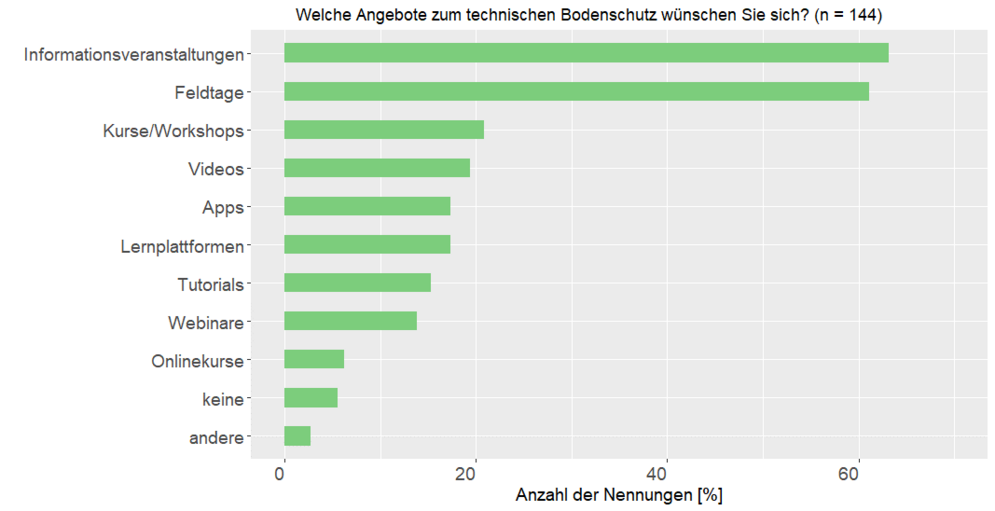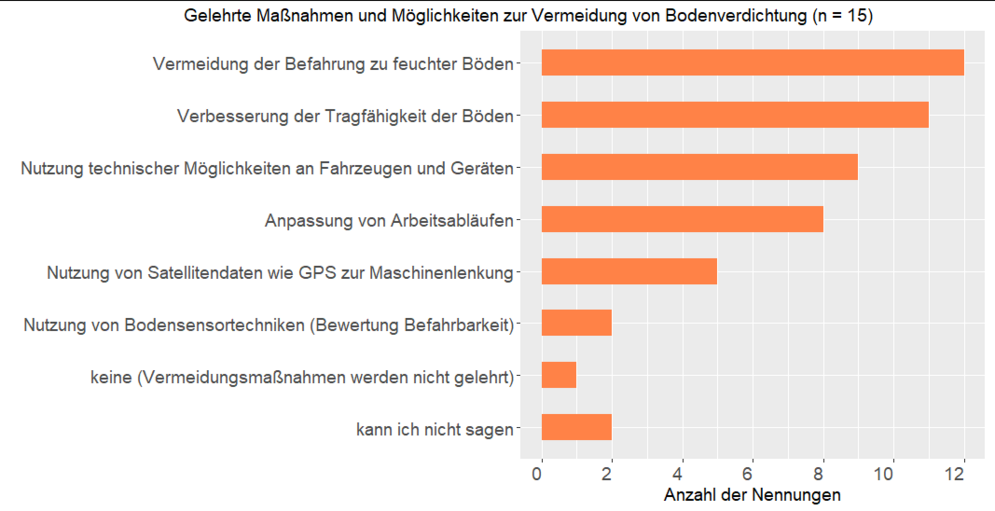Acceptance and knowledge transfer
The acceptance and implementation of (new) soil conservation technologies and measures by farmers, agricultural contractors, and advisors is essential to avoid soil compaction. To strengthen this, it is necessary to examine the status quo with regard to knowledge (acquisition) as well as the factors promoting and inhibiting the use of new technologies. Based on this, strategies for communication and knowledge transfer are developed.
In the first phase of the project, a comprehensive analysis of existing advisory instruments and information media was carried out for practical agricultural actors. This analysis was performed to communicate scientific findings in the field of soil compaction. Deficits in information transfer were identified in some cases. The results of a survey of farmers again showed the need and desire for information and advice. From the findings on existing information gaps and the need for advice and information, potentials for strengthening the knowledge transfer for the further course of the project can be derived.
The results of the first project phase also provide indications of suitable forms of communication and particularly relevant target groups for external communication. The main focus of the second project stage will therefore be on the two specific target groups, young farmers and agricultural contractors: Young farmers (in or shortly after education and studies) are at the beginning of their working life, so that they play an important role in the future prevention of soil compaction. Furthermore, it can be noted that agricultural contractors are increasingly taking over relevant field operations. They are therefore equally important actors in the implementation of measures to avoid soil compaction. Different forms of education (dual education, further education, and courses of study) of (future) farmers, skilled workers in agricultural contractors and agricultural advisors are examined with regard to the current state of the teaching of contents on soil compaction/prevention measures.
Further aspects of the sub-project are the assessment of the relevance of the topic soil compaction/protection for agricultural practitioners in their daily work processes. Furthermore, the identification of factors promoting acceptance of new technologies is also of relevance.
The analyses of the current status provide the basis for the identification and conception of suitable instruments for knowledge transfer as well as for the development of target group-oriented recommendations. In the course of this, the communication strategy created in the first project phase will also be further developed.
Acceptance of new technologies and measures
The societal trend towards digitization will have an impact on more and more agricultural processes. The acceptance of new (digital) technologies, applications, and measures in agricultural practice will be investigated and factors that promote or inhibit them will be identified.
Building on more general results on soil protection from the first project stage, the second project stage will focus on the acceptance of new technologies in the field of technical soil protection. Methods of empirical social research such as online surveys (see also Germany-wide online survey among farmers on the subject of soil compaction in the first project stage) and interviews will be applied. Furthermore, a literature analysis on the acceptance of new technologies in agriculture (in general as well as specific to soil protection) will be carried out.
Results on this topic can be found here at the end of the second project phase.
Status quo of the information and consulting services
To develop a concept for (improved) knowledge transfer, it is essential to investigate how knowledge on the topic of soil compaction is currently conveyed and acquired. In the first project phase, information and consulting services, professional journals, and official recommendations for action were investigated.
First, an internet research on existing advice instruments and information services (transfer media) in Germany, Switzerland, and Austria was carried out for agricultural practitioners. These are advisory instruments and information services which serve to communicate scientific findings on the topic of soil compaction.
The mediation of the following aspects using transfer media was considered: Definition, causes and consequences of soil compaction, signs and detection of soil compaction in the field as well as measures to reduce, prevent or remedy soil compaction. The results of the research are summarized in the so-called "Yellow Pages" on soil compaction. The following media types were included:
- Information brochures, leaflets, flyers, instructions, posters
- Events: Field days, workshop, further training
- Presentations
- Applications, websites, Excel applications
- Films
Information brochures were identified as the most commonly published type of media. State and federal institutions are the most frequent providers of transfer media, followed by professional associations and research institutions. An analysis of the five highest-circulation agricultural journals was carried out separately. Here it was striking that the topic is often only a secondary aspect in articles and is only very rarely treated as a main topic.
In addition, official recommendations for action on the subject of compaction were compiled on the basis of an Internet search. The aim was the analysis of legal requirements at federal and state level, including their enforcement, the classification into the EU level. Furthermore, a detailed analysis of brochures, flyers and other (consulting) tools was aspired. With regard to the quality, topicality and accessibility of the materials, positive aspects or examples as well as deficits were identified.
In addition to the analysis of the information and advice services, knowledge of demand and wishes on the part of practitioners is necessary to strengthen the transfer of knowledge. In an online survey, carried out in 2017, farmers were asked, among other things, what they would like to see in terms of technical soil protection. This revealed a clear preference for information events and field days over other offers (see figure "Desired offers for technical soil protection").
Knowledge transfer in education
In the second project phase, the transfer of knowledge on the subject of soil compaction and soil conservation measures in the various forms of education of agricultural practitioners and consultants will be investigated.
Nationwide online surveys are carried out with the key question "To what extent is soil compaction a relevant topic in agricultural training?" at vocational schools, technical colleges and universities as well as research on training plans and module catalogues. The content and form of the courses are also investigated in detail. In addition, the extent to which soil compaction is important in the day-to-day work of contractors and is taught in staff training courses is also being investigated.
Information on relevant courses of study at 15 different universities (9 universities and 6 universities of applied sciences) has already been collected by means of a survey of teaching staff at universities. It was shown that aspects of the topic "soil compaction" are more often dealt with in compulsory modules in Bachelor's degree courses than in Master's degree courses. This impression was confirmed by the keyword research of module catalogues or manuals.
The teaching content was taught in lectures, fieldwork/field exercises and seminars. Newer techniques for avoiding soil compaction, such as the "use of satellite data such as GPS for machine steering" or "use of soil sensor techniques to evaluate the trafficability" were less frequently taught than classical prevention measures. Measures of prevention are, for example, "Avoiding driving on soils that are too wet" (see figure "Measures to avoid soil compaction in university teaching (agricultural sector)").
Further results on this topic in the course of the second project phase can be found here.
Development of target group oriented recommendations
Based on the knowledge gained from the education and the existing advisory and information services, the communication strategy will be further developed with a special focus on the target groups of young farmers and contractors.
Results on this topic can be found here at the end of the second project phase.
Strengthening the transfer of knowledge
To strengthen the transfer of knowledge, suitable instruments (transfer media) are characterized and designed.
Possible and suitable instruments for knowledge transfer (e.g. information material such as fact sheets, teaching material or a web-based knowledge platform) are identified and designed. From the beginning, important multipliers and stakeholders will be involved to test or validate the transfer media to be developed and successively develop them further.
Results on this topic can be found here at the end of the second project phase.

